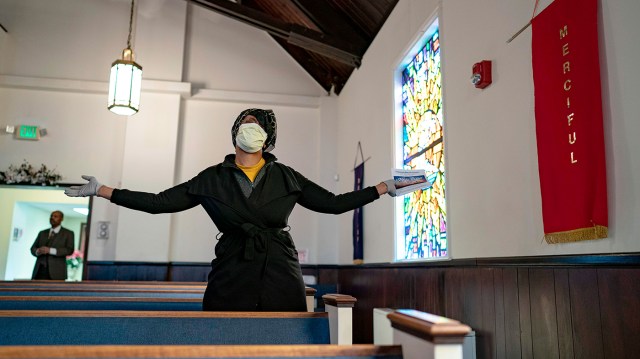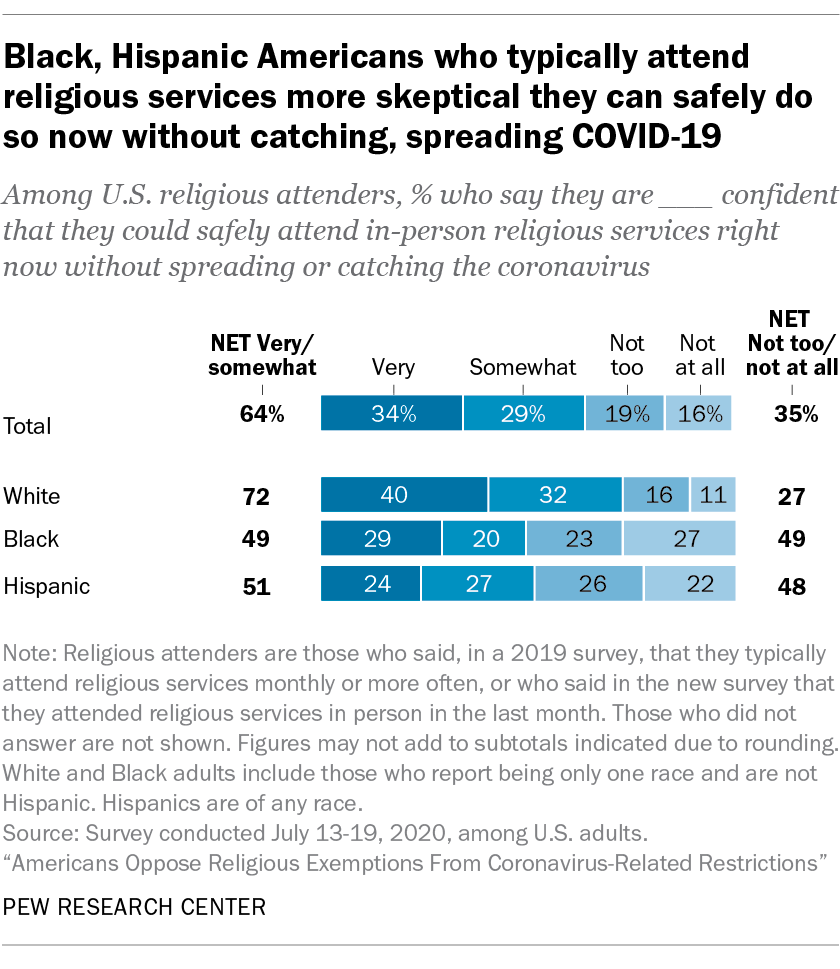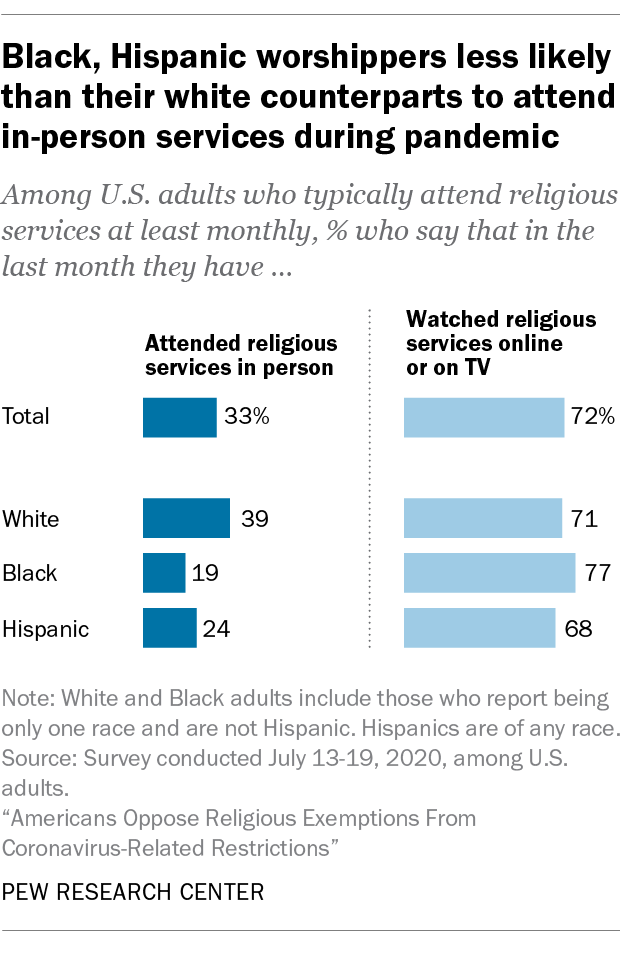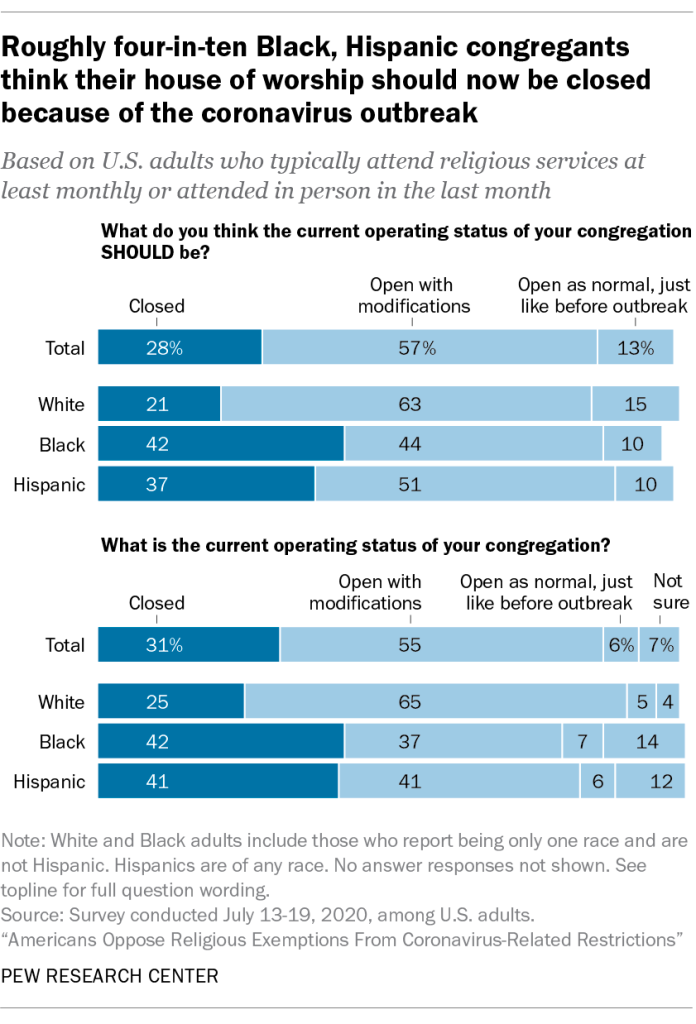
Black and Hispanic adults in the United States have been hit hard by the coronavirus outbreak and are more likely than white Americans to be concerned about contracting the virus and unknowingly spreading it to others. And these racial and ethnic discrepancies extend to the perceived safety of attending religious services during the outbreak, according to a new Pew Research Center survey.
Nearly three-quarters of white adults who report that they regularly attend religious services (72%) say they are “very” or “somewhat” confident they could safely attend in-person services right now at their regular house of worship without spreading or catching the coronavirus. By contrast, around half of Black (49%) and Hispanic (51%) Americans who are similarly observant express such confidence. The other half of Black and Hispanic attenders say they are “not too” or “not at all” confident they could safely go to in-person religious services right now without spreading or catching the virus, according to the survey, which was conducted July 13 to 19.
In this analysis, regular religious service attenders are defined as those who said in a 2019 survey that they typically attend services at least once or twice a month or say in the new survey that they attended in-person services in the last month.
Pew Research Center conducted this survey to help understand how the coronavirus outbreak has affected the worship habits of Americans. For this analysis, we surveyed 10,211 U.S. adults, including 3,756 who said in a 2019 survey that they typically attend religious services at least once a month or who said in the new survey that they attended in-person religious services during the past month. The survey was conducted from July 13 to 19, 2020. All respondents to the survey are part of Pew Research Center’s American Trends Panel (ATP), an online survey panel that is recruited through national random sampling of residential addresses. This way nearly all U.S. adults have a chance of selection. The survey is weighted to be representative of the U.S. adult population by gender, race, ethnicity, partisan affiliation, education and other categories. For more, see the ATP’s methodology and the methodology for this report.
The questions used in this analysis can be found here.
Black and Hispanic worshippers also are less likely than their white counterparts to say they have actually gone to church or another house of worship recently. Just 19% of Black adults who typically attend religious services at least monthly (according to the 2019 survey) say they have gone to in-person services in the past month, and one-in-four Hispanic worshippers report having done so. By comparison, 39% of white worshippers say they attended in-person services in the last month.
Not surprisingly, those who say they feel safe attending in-person services are much more likely to have actually attended in-person services this summer, and this pattern holds true across racial and ethnic groups.
At the moment, watching religious services online or on TV is the more popular option for worshippers across racial and ethnic groups, although Black religious attenders (77%) are somewhat more likely than white (71%) and Hispanic (68%) attenders to say they have watched religious services online or on TV in the last month.
The higher levels of caution that Black and Hispanic adults have with respect to COVID-19 also are apparent when it comes to opinions about how – or if – houses of worship should be operating right now. Black and Hispanic attenders are far more likely than white attenders to say that their own congregation should be closed for in-person services: About four-in-ten Black (42%) and Hispanic attenders (37%) say this, compared with 21% of white attenders.
It is not that most white attenders think their congregations should be open without restrictions; just 15% say their houses of worship should currently be open to the public as normal, just as they were before the pandemic. But among white attenders, a majority (63%) think their congregation should be open for in-person religious services with modifications in place due to the coronavirus outbreak – such as social distancing, mask requirements or limited attendance. Fewer Black (44%) and Hispanic (51%) attenders say this is the right option for their congregations.
Opinions about what houses of worship should be doing during the coronavirus outbreak seem to reflect what respondents’ congregations actually are doing. White worshippers are much more likely than their Black and Hispanic counterparts to report that their congregations are holding in-person services with precautions in place. Roughly two-thirds of white attenders (65%) say their congregation is open in this way, compared with fewer Black (37%) and Hispanic (41%) worshippers. Meanwhile, about four-in-ten Black and Hispanic attenders say the congregation they attend most often is currently closed for in-person worship, compared with one-quarter of white attenders who say this.
Note: Here are the questions used for this report, along with responses, and its methodology.



